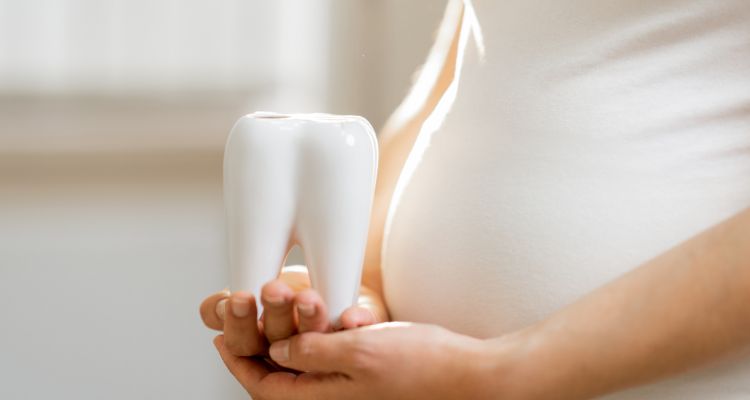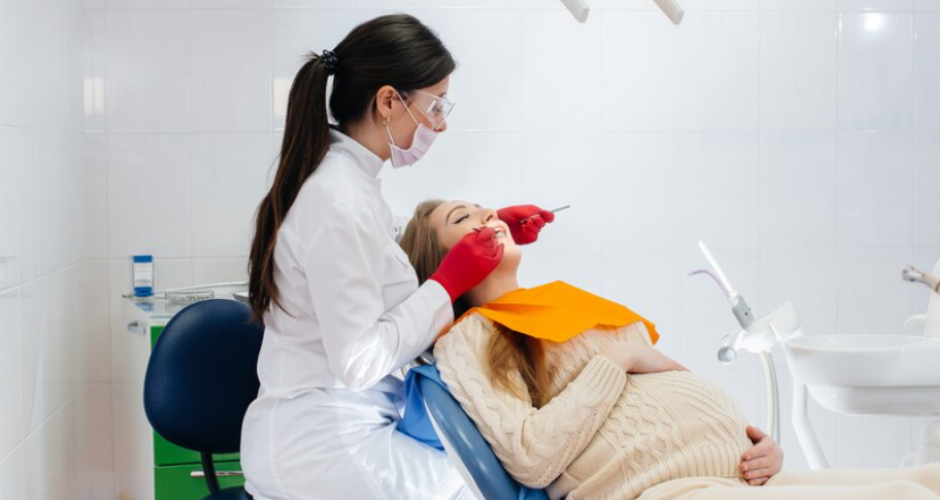Caring for Your Oral Health During Pregnancy

Pregnancy is an incredible journey filled with joy, anticipation, and change. While many expecting mothers focus on prenatal care and the health of their growing baby, it’s important not to overlook another critical aspect of well-being—oral health during pregnancy.
Dental care for pregnant mothers is not just a matter of aesthetics; it can significantly impact both the mother’s and baby’s overall health. In this comprehensive guide, we will explore oral health considerations in pregnancy, oral health care guidelines, and essential oral hygiene practices for pregnant patients.
Oral Health Considerations in Pregnancy
Pregnancy is a time of profound hormonal changes, and these changes can have a direct impact on oral health. Understanding these transformations is crucial for maintaining good dental health throughout pregnancy.
- Hormonal Shifts: One of the primary culprits behind dental issues during pregnancy is hormonal fluctuation. Elevated levels of hormones like estrogen and progesterone can affect the gums, making them more prone to inflammation and bleeding. This condition, known as gingivitis, is a common concern for pregnant women.
- Morning Sickness: Nausea and vomiting, commonly referred to as morning sickness, can expose teeth to stomach acid, increasing the risk of enamel erosion and tooth decay. Managing morning sickness and its effects on oral health is a critical aspect of dental care during pregnancy.
Dental Health During Pregnancy
Maintaining dental health during pregnancy requires a combination of regular dental check-ups, proper oral hygiene, and a balanced diet. Here are some key guidelines to follow for how to prevent dental problems in pregnancy:
1. Regular Dental Check-ups and Cleanings
Dental care for pregnant mothers should include routine visits to the dentist. These visits are safe and essential for monitoring and maintaining oral health during pregnancy. Here’s what you need to know:
- Importance of Prenatal Dental Care: Prenatal dental care is not only safe but also crucial. Inform your dentist about your pregnancy during your visit, as they may need to make adjustments to your treatment plan.
- Safe Dental Treatments: Many dental procedures can be safely performed during pregnancy. However, elective procedures like teeth whitening and certain X-rays should be postponed until after childbirth. Always consult your dentist about the safety of any proposed treatments.

2. Oral Hygiene Practices
Effective oral hygiene practices are fundamental to oral health care for the pregnant patient. Proper brushing and flossing techniques are essential:
- Proper Brushing and Flossing Techniques: Use a soft-bristle toothbrush and fluoride toothpaste to brush your teeth gently for two minutes, at least twice a day. Don’t forget to floss daily to remove plaque and food particles from between your teeth.
- Choosing the Right Toothpaste and Mouthwash: Opt for toothpaste that contains fluoride to strengthen your tooth enamel. When selecting mouthwash, look for alcohol-free options, as they are less likely to cause irritation.
3. Nutrition and Diet
Your diet plays a crucial role in maintaining your oral health during pregnancy. Here’s what you should consider:
- Foods for Strong Teeth and Gums: Incorporate foods rich in calcium, such as dairy products, leafy greens, and fortified cereals, to support tooth and gum health. Additionally, vitamin C from fruits and vegetables can help promote gum health.
- Foods to Avoid: Limit your intake of sugary snacks and beverages, as they can contribute to tooth decay. Acidic foods and drinks, like citrus fruits and sodas, can also erode tooth enamel, so consume them in moderation.
4. Morning Sickness and Oral Care
Morning sickness is a common occurrence during pregnancy. While it may be difficult to prevent, you can take steps to protect your teeth from the effects of stomach acid:
- Coping with Vomiting and Acid Reflux: Rinse your mouth with water or a fluoride mouthwash after vomiting to help neutralize stomach acid. Avoid brushing your teeth immediately after vomiting, as the softened enamel can be easily damaged.
- Protecting Teeth from Stomach Acid: Consider using a fluoride rinse or toothpaste to strengthen your teeth and make them more resistant to acid erosion.
5. Managing Pregnancy Cravings and Oral Health
Pregnancy often brings about unique cravings, which can sometimes lean towards sugary or acidic foods. Here’s how to balance indulgence with oral health:
- Avoid Excessive Sugary Snacks: While it’s okay to indulge occasionally, try to limit your consumption of sugary treats. If you do indulge, remember to brush and floss afterward.
- Healthy Alternatives for Satisfying Cravings: Opt for healthier snack options like crunchy fruits and vegetables, which can help stimulate saliva production and naturally clean your teeth.

Addressing Common Oral Health Concerns During Pregnancy
In addition to following the guidelines above, it’s essential to be aware of and address common oral health issues that can arise during pregnancy:
1. Dealing with Gum Inflammation (Gingivitis)
- Symptoms and Early Detection: Gingivitis often presents with symptoms such as red, swollen, and bleeding gums. Early detection and intervention are crucial.
- Tips for Preventing and Managing Gingivitis: Maintain good oral hygiene, and consider using an antimicrobial mouthwash with your dentist’s approval. Regular dental cleanings can also help prevent and manage gingivitis.
2. Preventing and Treating Cavities
- Importance of Fluoride: Fluoride is particularly important during pregnancy. It helps strengthen tooth enamel and prevents cavities. Ensure your toothpaste contains fluoride, and discuss fluoride treatments with your dentist.
- Safe Dental Procedures: Necessary dental procedures like fillings and root canals can typically be performed during pregnancy. Consult your dentist to address any dental issues promptly.
3. Pregnancy Tumors: What to Expect and When to Seek Treatment
- Understanding the Causes: Pregnancy tumors, small, non-cancerous growths on the gums, can develop due to hormonal changes. They are typically painless but can be uncomfortable.
- Dental Interventions for Pregnancy Tumors: In most cases, pregnancy tumors resolve on their own after childbirth. However, if they cause discomfort or interfere with oral hygiene, your dentist may recommend removal.
The Importance of Postpartum Oral Care
After giving birth, it’s essential to continue prioritizing your oral health:
1. Dental Care After Childbirth: Schedule a dental check-up within the first few months postpartum to address any lingering oral health issues.
2. Addressing Any Lingering Oral Health Issues: If you experienced dental problems during pregnancy, such as gingivitis or tooth decay, ensure they are properly addressed after childbirth to prevent further complications.
3. Setting a Positive Example for Your Child’s Oral Health: As your child grows, your oral health habits will influence theirs. Demonstrating good oral hygiene practices sets a positive example for your child’s future dental health.
Conclusion
Caring for your oral health during pregnancy is an integral part of overall prenatal care. By following these guidelines for dental care for pregnant mothers, you can minimize the risk of dental issues, promote a healthy pregnancy, and ensure that both you and your baby start this exciting journey with radiant smiles. Remember that regular dental check-ups, proper oral hygiene practices, and a balanced diet are your allies in maintaining optimal oral health during this remarkable time in your life.
FAQ’s
How does pregnancy affect your oral health?
Pregnancy can lead to hormonal changes that increase the risk of oral health issues. Elevated hormone levels, especially estrogen and progesterone, can make gums more sensitive and prone to inflammation (gingivitis). Additionally, morning sickness can expose teeth to stomach acid, potentially leading to enamel erosion and tooth decay.
Is it safe to receive dental care while pregnant?
Yes, it is generally safe to receive dental care during pregnancy. In fact, it’s recommended to continue with regular dental check-ups and cleanings. However, inform your dentist about your pregnancy, and they may adjust treatment plans or delay elective procedures until after childbirth.
Can pregnancy lead to more serious dental problems?
While most oral health issues during pregnancy are manageable, neglecting dental care can lead to more serious problems. Untreated gum inflammation (gingivitis) can progress to periodontal disease, which is associated with various health complications. Moreover, dental infections left untreated can pose risks to both the mother and the developing baby.
Are there specific oral health guidelines for pregnant women?
There are no distinct guidelines for oral health during pregnancy, but the general principles of good oral hygiene, regular dental check-ups, and a balanced diet apply. Consult with your dentist about your pregnancy, and they can provide personalized recommendations and advice.
Can dental problems during pregnancy affect the baby’s health?
Dental problems during pregnancy, if left untreated, can potentially affect both the mother’s and the baby’s health. Severe gum disease and dental infections may increase the risk of preterm birth and low birth weight. Therefore, maintaining good oral health is essential for the well-being of both mother and child.






3 thoughts on “Caring for Your Oral Health During Pregnancy”